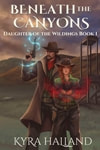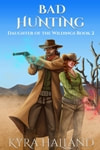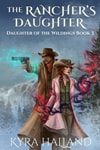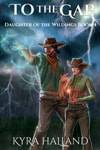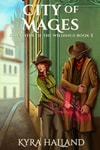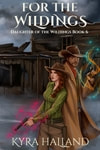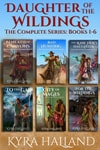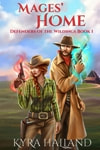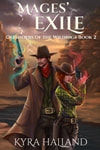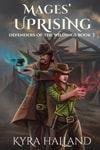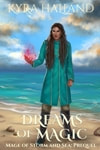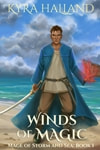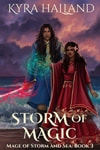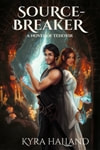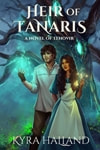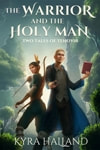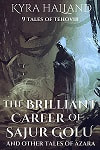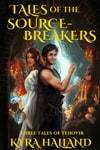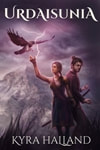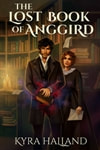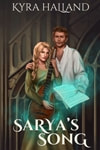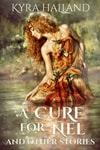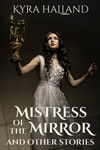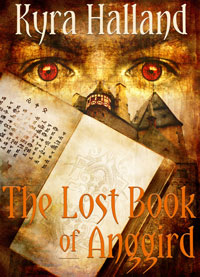 Every author has one. The Book of Eternal Revisions, where you need "just one more draft" to make it "good enough." And of course, each "one last draft" leads to another and another and another... For me, that book is The Lost Book of Anggird. Aside from the, oh, sixteen years or so it took me to sort out the story and characters and finish the first draft, this book has been through more revisions than any other of my books. And not because the first draft was that bad; really, looking back on it now, it was really pretty good, as far as first drafts go. No, the reason why I ended up going over and over and over it again was a bit of advice that prevails on various writing sites and forums (actually two bits of advice that form kind of an evil, story-eating symbiosis of doom): Before unleashing your novel on the world, polish it till it gleams, and a major part of this polishing is the removal of every unnecessary word. At the time that I completed the draft of Lost Book and began the unending cycle of revisions and edits, I was heavily under the influence of a certain forum popular among writers, which is especially focused on "professional" writing - that is, writing for conventional publication. The advice quoted above is prevalent on that forum. I was feeling my way back into writing original fiction after a long stint as a prolific fanfiction writer, and wondering if maybe I should consider testing the waters in the shark, er, agent pool again, so I paid diligent attention to everything said by the "experts" on the forum, and tried to apply it to my writing. (The thought of starting to query agents again lasted about 5 minutes, then died a swift and well-deserved death.) And, over three years of revising Lost Book according to those guidelines, here's what happened: When I got the feedback on Version 7 of Lost Book back from my test readers a few months ago and went in to do this last big round of revision, I realized that the prose was mushy and bland, almost entirely devoid of any color or personality whatsoever. I've been complimented on what people call my smooth, clear writing style, and received comments to that effect on Lost Book, but what I noticed went beyond smooth and clear. What I had done in the pursuit of producing "acceptable" writing was I had stripped out much of the lively language, interesting details, and other bits of personality from my writing. I started reading the manuscript and almost immediately began thinking, That doesn't say what I meant, and, Wow, that sentence was boring - made boring in my attempt to smooth out the flow and present my ideas in the fewest words. It was like unflavored, watery Cream of Wheat, or that rice cereal you feed to babies. With no lumps or sharp edges or interesting sticky-out bits - they'd all been smoothed out and polished into oblivion. Now, the advice to avoid unnecessary words isn't all bad. It's rooted in some good principles. In general, it's good to avoid repetitious redundancies and long passages that have nothing whatsoever to do with the story, and excessively purple prose. But carried too far, you end up with "See Spot run. Spot is a dog." Or this thrilling passage from Lost Book, "There was a fire. The man was scared. He stole a horse." Just kidding. It's not that bad. But when I started reading the manuscript to do this revision, I just knew that it wasn't right, it wasn't my voice. In the meantime, since starting to realize that those bits of advice from that writer's forum aren't neccesarily the best, I'd also started reading Dean Wesley Smith's blog. Mr. Smith has a completely opposite approach to revision: don't. Or if you have to, revise as little as possible. I also took Holly Lisle's online How To Revise Your Novel course, which takes the approach that you identify what works with your story and what doesn't, fix what doesn't work, and get it all done in one big revision then get the novel out the door and get to work on the next one. I need a little more revision than no passes or one pass, but I've taken the spirit behind Mr. Smith's and Ms. Lisle's revision philosophies and formulated my own advice: Don't revise to other people's rules, don't revise the life out of your story, use the words and sentence structures that most closely say what you want to say in the way you want to say it, and trust your own creative vision. So with this go-round on Lost Book, what I'm doing (besides making the revisions suggested by the test reader feedback) is adding back in the life and style and individual voice that I'd stripped out in previous revisions. As I read, I'm paying attention to the difference between what's on the page and the way the prose comes naturally into my mind and changing what's on the page to my natural voice. I'm adding back in details, fun asides, extra lines of dialogue that give more insight into mindsets and relationships, and lots of other things to make it a fuller, richer story told in my voice. So far I've added back in about 7,000 words, even while trimming some things that did still need to be cut. And, for the first time in a long time, I'm excited about this story again, and I can't wait until it's ready to share with my readers.
6 Comments
8/7/2013 11:20:43 am
I don't remember when I came up with this solution to the "remove all unnecessary words" advice, but I can say it really works:
Reply
Kyra
8/7/2013 11:53:13 am
lol, excellent advice! (I love P.G. Wodehouse :-D)
Reply
Yeah... the polish until it shines advice isn't bad, as long as the writer remembers what "shining" actually means.
Reply
Kyra
1/26/2014 08:06:49 am
Yes, you're absolutely right. A lot of times in those discussions, "polished" seems to mean "doesn't break any of the zillion rules about what words you aren't supposed to use," and following all those arbitrary rules seems to take precedence over having an individual style and voice.
Reply
Michael Kessinger II
1/26/2014 05:15:36 am
Good advice. I have recently starting looking for an agent on a book that I have revised about 4 times and spent a few years on. I am currently working on the second book, but only allowing yourself so many revisions is something I haven't given much thought to. I will definitely put this to use! Thanks!
Reply
Kyra
1/26/2014 08:09:08 am
One of my favorite sayings is "Perfect is the enemy of good enough," or, alternatively, "Perfect is the enemy of done." And it's too easy, in the quest for perfection (which really doesn't exist in art), to make your work worse instead of better.
Reply
Your comment will be posted after it is approved.
Leave a Reply. |
AuthorI am Kyra Halland, author of tales of fantasy, heroism, and romance. Sign up for my email list
My Books
More Books
Click on the covers for more information
Categories
All
Archives
April 2024
Kyra Halland: Welcome to My Worlds is a participant in the Amazon Services LLC Associates Program, an affiliate advertising program designed to provide a means for sites to earn advertising fees by advertising and linking to amazon.com.
Other links on this site may also lead to products for which the owner may receive compensation. This website uses marketing and tracking technologies. Opting out of this will opt you out of all cookies, except for those needed to run the website. Note that some products may not work as well without tracking cookies. Opt Out of Cookies |
 RSS Feed
RSS Feed
